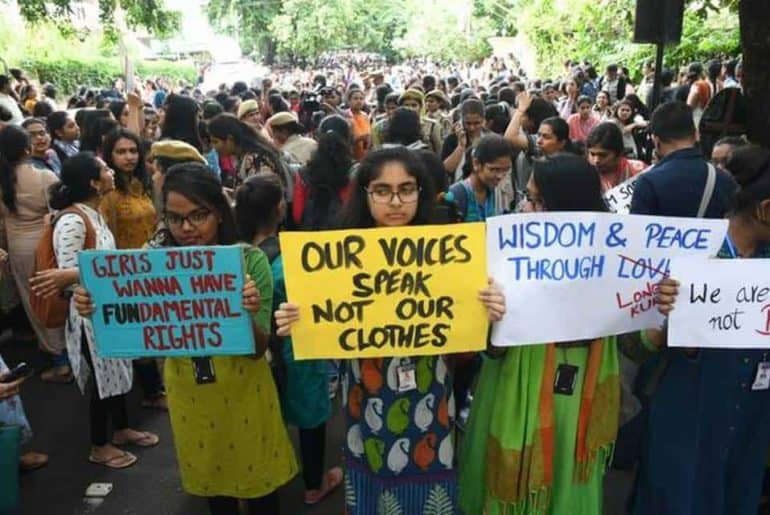Education is meant to liberate the educated. Read on to know what happens when there exists a polarity between the two.
Recently, a video of St. Francis College, Hyderabad, had made rounds on the internet. The video was received with widespread outrage across different social media platforms. The protesting students alleged that a faculty member had shamed a student for wearing a sleeveless dress. “The head of my department gave the example of actors who are paid to wear ‘such clothes’. That statement affected me. I have written down this incident verbatim in my book,” an enraged student said. “Sr. Sandra announced a new dress code change in the middle of the year and her colleagues told our representatives that a long kurta would get us good marriage proposals. They told our representatives that standing up for a cause is blasphemous, raising your voice is blasphemous.
This went against the very grain of our values as millennials of the 21st Century. Things got worse, every day we were all humiliated for wearing a kurta that was just an inch or less above the knee, we were made to stand outside the college, losing out on classes and tests. Things did not stop there, the college went ahead and hired female security guards in the pretext of security, these female guards were checking the length of our kurtas, they went ahead and pulled girls by their ID (identity) cards and even pulled their kurtas,” Zanobia Tumbi, who is a student at St. Francis, posted on her Facebook profile, along with the video. Eventually, the women decided to protest and were finally allowed to wear “long tops” to college. But that does not even begin to end the discourse. The Indian education system, specifically talking about higher education, has a way of putting unnecessary obligations on students.
Be it a certain way of dressing, a mandatory minimum attendance, or a particular way of writing the papers to fetch more marks, they all contribute to cease the liberty of students. What is worrying is that the students of these institutions have internalised this behaviour, and do not really seem to have a problem with it. When I asked a few students studying in a reputed college which followed the same practice, their answers ranged from, “I have never given it a thought,” to “No, I don’t have anything to say about it.” When humans are fed a diet of entirely problematic substances, they stop dissecting the reality to find out the truth.
Something similar seems to be happening with the Indian youth, and this is a cause of concern. Education is supposed to make them distinguish between real and false virtues, but in such cases, it is robbing them of it. When there is an imposition of uncalled-for rules, it tends to hamper with the real issues plaguing the country and the world as communities. India lags behind when it comes to research, innovations, and modifications in education. Instead of sanitising the post-millenials of their ungodly ways, the system should take a long, critical look within its cracks and make amends to the damage. While the whole world is progressing to form a more holistic approach towards education, actions such as these put a big question mark on the system.
There is also a debate about what the parents’ reaction is. According to the management of St. Francis, most of the parents had received this decision of their daughters wearing a kurta in a positive light. In this situation, dissent, and not the narrative of “disobedience” that we have been fed, is necessary. Across colleges, and especially in women’s educational institutions, patriarchy or moral policing should have no space. Such places in Hyderabad, Delhi, Mumbai, or across smaller cities, have given the country women that the world is proud of. If we limit them to, and define them by what they wear, these places will stop producing the kind of talent that they have. In an educational institution of the present time, moral policing on women’s bodies and clothing should be the topic of criticism and not a notice issued by the authorities who hold power. When it comes to learning, steps like these comply with the misogyny and sexism women in our country, and from all over the world, have actively been fighting to put in the past.
Feature Image Credits: The Hindu
Maumil Mehraj




Comments are closed.